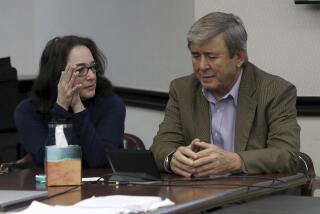Suit Says Suspects’ Parents Deserve Blame in Tay Killing
- Share via
TUSTIN — The parents of teen-age slaying victim Stuart Anthony Tay charged in an unusual civil lawsuit Thursday that the parents of their son’s accused killers contributed to the tragedy through lax and careless supervision of their children.
Attorneys for Alfred and Linda Tay, whose 17-year-old son was slain last New Year’s Eve, demanded unspecified damages from the parents of four juvenile suspects in the case.
“Parents should be responsible for bad parenting,” Mark E. Edwards, one of the attorneys representing the Tays, said in a press conference. “It’s that simple. The Tays want to bring awareness to their plight and to the serious problem of violent juvenile crime. . . . When kids are bad, you look at the parents.”
Edward Djang, another attorney representing the Tays, said the couple wrestled with the notion of filing the lawsuit, fearing it might appear they were motivated by a desire for money.
“They’re not,” Djang said. Instead, Djang said the Tays filed the suit to promote the role parents can play in discouraging teen violence.
“I think parents should be responsible for their minor children,” Linda Tay said in an interview from her home Thursday. “People should think of their actions and be a little more responsible.”
But some of the defense attorneys representing the teen suspects scoffed at that claim.
“I just think it’s absurd that a lawsuit is going to send a message to parents that they should be more involved with their children,” said Denise Gragg, the public defender representing 16-year-old suspect Abraham Acosta. “I think somebody is looking to make a name for themselves or get some fame. This lawsuit is not going to do anybody any good.”
Acosta is the youngest of five teens charged in the slaying of the Foothill High honor student, an incident that has come to symbolize the tragedy of youth violence in Orange County. One of the suspects, 19-year-old Robert Chien-nan Chan, is being tried as an adult so his parents were not included in the Tays’ lawsuit.
The lawsuit claims the parents of the four juveniles were partly to blame for the tragedy, but it also seeks unspecified damages from all five suspects in a separate wrongful death claim.
*
Police say Stuart Tay was beaten with a sledgehammer and then rubbing alcohol was poured down his throat and duct tape was placed over his mouth. His body was later discovered buried in a shallow back yard grave.
Police allege that Acosta and the four others conspired to kill Stuart Tay because they feared that he intended to betray their plans to commit a computer heist.
The five suspects, all students at Sunny Hills High School in Fullerton, had a resume of school activities that seemed more typical of honor roll students than murder suspects. One student aspired to be Sunny Hills’ valedictorian. Another was a YMCA volunteer in the child care section. A third was a high school athlete.
Edwards conceded Thursday that he is treading into new territory with a “bad parenting” lawsuit. He said he could not define a parent’s supervising responsibilities, saying they should be decided by the court.
To challenge parenting skills, Edwards relied on a section of the state civil code that ordinarily only applies to cases involving property damage, vandalism or graffiti. That law limits monetary damages to $10,000 to cover medical expenses.
Both Edwards and Djang also declined to answer questions about the restrictions the Tays placed on their own son, who was friendly with the other suspects. They said those were issues that would be raised during the criminal trial, which is scheduled to start Jan. 10. Several attorneys involved in the case said, however, that the trial is likely to be delayed.
“Whether or not the Tay boy was an angel is all circumstantial information,” Edwards said. “The fact is he was brutally bludgeoned and killed. . . . What we want to do is bring awareness of the fact that something is not working.”
Times staff writer Jodi Wilgoren contributed to this story.
More to Read
Sign up for Essential California
The most important California stories and recommendations in your inbox every morning.
You may occasionally receive promotional content from the Los Angeles Times.













